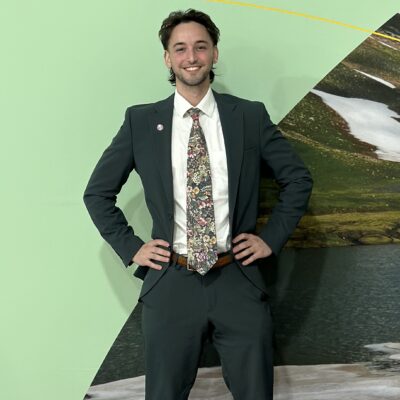Student Spotlight: Alexander Gonzalez

August 11, 2025
Alexander Gonzalez is a doctoral candidate in chemical engineering from Hollywood, Florida. He earned his B.S. in chemical engineering at Florida State University and now studies the conversion of carbon dioxide using renewable electricity under the guidance of Tobias Hanrath at Cornell.
What is your area of research and why is it important?
I work on converting carbon dioxide (CO₂)—the same gas driving climate change—into useful fuels and chemicals using renewable electricity. My research focuses on pulsed electrochemical systems, where I study how dynamic voltage signals can control reactions at the molecular level and optimize performance in larger, scalable reactor systems. Instead of viewing CO₂ as a liability, I’m turning it into an opportunity—closing the carbon loop and building a circular carbon economy. A major focus of my work is designing systems that remove CO₂ from the ocean, a critical and often overlooked carbon reservoir, while producing clean energy in the process.
What are the larger implications of this research?
By advancing carbon-to-fuel technologies, this work supports scalable climate solutions that reduce emissions and harness waste CO₂ as a resource. Ocean-based CO₂ removal, in particular, opens the door to large-scale carbon recycling that complements renewable energy deployment. These technologies don’t exist in a vacuum—they require integration with infrastructure, policy, and people. That’s why I’m equally focused on translating these scientific innovations to engineers, decision-makers, and communities working to decarbonize our world.
What did you learn from participating in Cornell’s Advocacy Day?
Advocacy Day taught me how to effectively communicate the societal value of science and the mechanics of how research funding is allocated. I learned that targeting the right committees, like appropriations and authorizing committees, can amplify the impact of our advocacy. Most of all, I saw firsthand how powerful we are as constituents—our representatives want to hear from us, especially at the local level where their reelection depends on listening to our needs and priorities. It was empowering to realize that scientists can shape policy from both inside and outside the lab.
Why do you feel it is important to advocate for federal funding for research?
Federal research funding transforms bold ideas into breakthrough technologies. It underpins U.S. leadership in innovation and drives progress in everything from clean energy to public health. Investing in research is not just good science—it’s good policy. It boosts the economy, creates jobs, and enables students like me to contribute solutions to our biggest global challenges. Advocacy ensures that our work remains supported, accessible, and aligned with the public good.
What are your hobbies or interests outside of your research or scholarship?
I love playing piano, listening to music, shooting pool with friends, floating on the lake, and enjoying good Latin food. I’m also passionate about mentoring undergraduate researchers—helping others grow in science has become one of the most fulfilling parts of my graduate experience.
Why did you choose Cornell to pursue your degree?
Cornell is one of the top universities for novel energy research, with world-class faculty and facilities in sustainability and electrochemistry. But beyond that, Cornell gave me the freedom to explore my full potential. I’ve grown not just as a scientist and engineer, but as a well-rounded scholar—developing skills in entrepreneurship, science policy, and public communication. The culture of mentorship and interdisciplinary collaboration here has shaped me into a researcher who’s ready to make a real-world impact.
